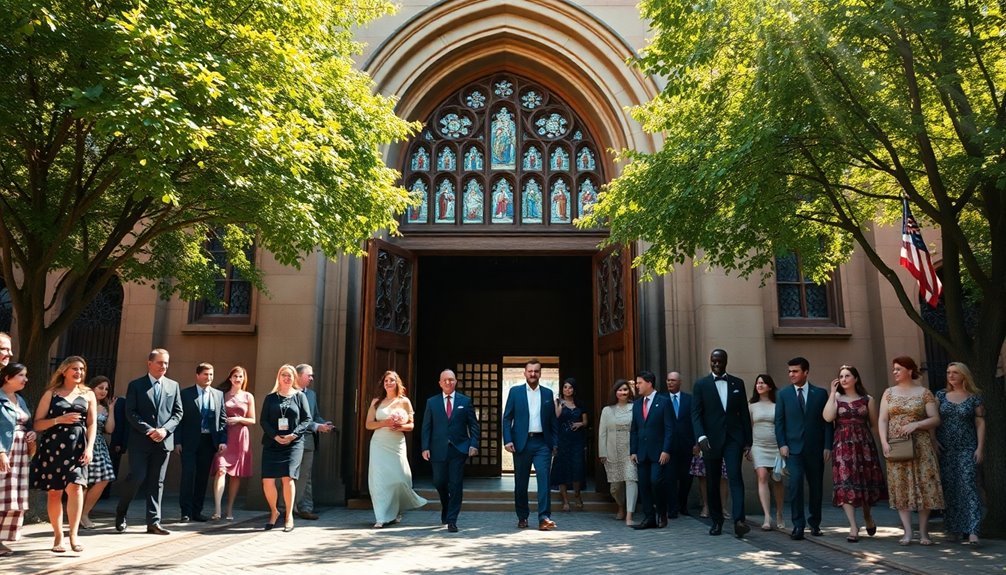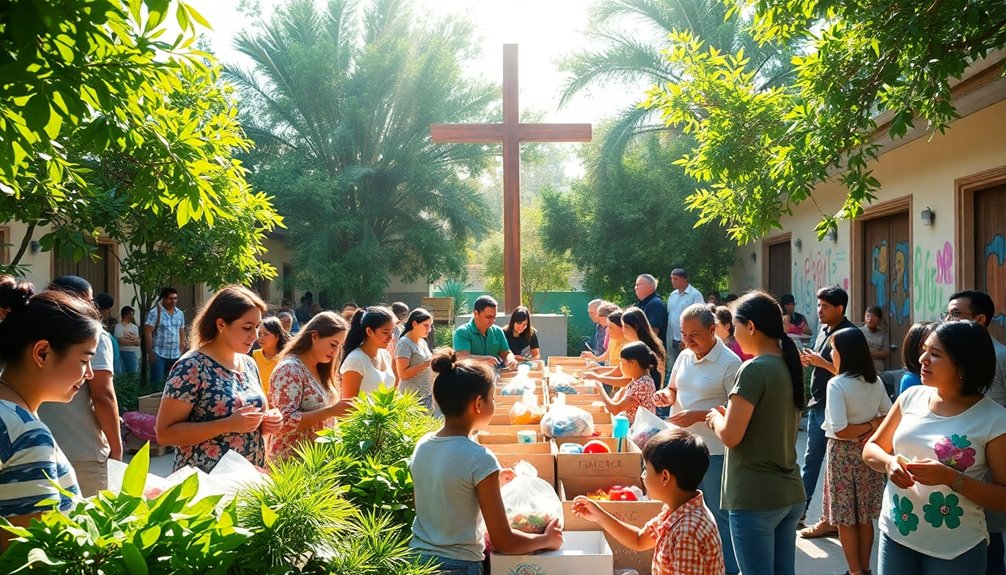The Bible emphasizes the importance of going to church as a way to strengthen your faith and connect with others. In Hebrews 10:25, you're encouraged not to neglect meeting together for mutual support and encouragement. Early Christians gathered regularly for teaching, worship, and fellowship, as highlighted in Acts 2:42. This communal aspect of faith helps prevent spiritual isolation and fosters an environment where you can grow. When you gather with others in Christ's name, His presence is promised (Matthew 18:20). Discovering more about these gatherings and their significance can truly enhance your spiritual journey.
Key Takeaways
- The Bible emphasizes the importance of gathering together for mutual encouragement and spiritual growth, as seen in Hebrews 10:25.
- Early Christians regularly met for worship, teaching, and fellowship, illustrating the communal aspect of faith in Acts 2:42.
- Every believer plays a crucial role in the body of Christ, indicating that church participation is essential for spiritual health (1 Corinthians 12:14-20).
- Regular church attendance fosters a deeper connection with God and fellow believers, enhancing faith and accountability within the community.
- Community service and outreach initiatives demonstrate faith in action, reinforcing the importance of collective efforts in sharing the Gospel.
Introduction

When you think about your faith, it's hard to overlook the significance of gathering together with others. The Bible emphasizes this communal aspect in several passages, reminding you that the church isn't just a building; it's a community designed for spiritual growth. In Acts 2:42, early Christians devoted themselves to teaching and fellowship, showing how essential it's to engage with one another in faith.
Hebrews 10:25 urges you not to neglect meeting together, highlighting the importance of community in your faith journey. When you gather in Jesus' name, as promised in Matthew 18:20, His presence enriches your experience and encourages you to grow. This collective worship creates an environment where you can support each other, fostering deeper connections and spiritual growth.
Moreover, church leaders, as described in Ephesians 4:11-13, play a critical role in equipping you for ministry. They help guide and nurture your faith, ensuring you're prepared to encourage one another.
Ultimately, participating in church life is vital for developing strong, supportive relationships that deepen your understanding of God and enhance your spiritual journey.
Essential Bible Verses

When it comes to understanding the importance of church attendance, several key Bible verses stand out.
These scriptures not only highlight the significance of gathering together but also reveal how each member contributes to the community's health.
Let's explore these essential references to see how they guide your involvement in the church.
Primary Bible References
The Bible provides several key verses that highlight the importance of gathering together as a church community. In Hebrews 10:25, you're reminded not to neglect meeting together but to encourage one another, especially as you see the day approaching. This verse underscores the vital role of going to church for mutual support in your faith journey.
Acts 2:42 paints a picture of the early church committed to teaching, fellowship, breaking bread, and prayer. These foundational practices illustrate how the body of Christ thrives in community.
In Matthew 18:20, Jesus assures you that where two or three gather in His name, He's present, reinforcing the significance of communal worship.
Moreover, 1 Timothy 3:15 describes the church as the household of God and a pillar of truth, emphasizing its essential role in your spiritual life.
Lastly, Colossians 3:16 encourages you to teach and admonish one another through psalms, hymns, and spiritual songs, reflecting the importance of shared worship and learning.
These verses collectively stress that going to church isn't just beneficial; it's essential for the growth and encouragement of the body of Christ.
Secondary Bible References
In addition to the key verses already mentioned, several secondary references in the Bible further emphasize the importance of gathering in church. Hebrews 10:25 clearly states that you shouldn't neglect to meet together, highlighting the need for communal worship and mutual encouragement among believers. This is essential for fostering a vibrant church attendance.
Acts 2:42 showcases how the early church devoted themselves to teaching, fellowship, breaking bread, and prayer, which are foundational practices that strengthen your faith and community ties.
Furthermore, Matthew 18:20 reassures you that when two or three gather in Jesus' name, He's present among you, reinforcing the significance of collective worship.
In 1 Timothy 3:15, the church is described as the household of God and a pillar of truth, showcasing its vital role in nurturing faith and maintaining doctrinal integrity.
Lastly, Ephesians 4:11-13 outlines how church leaders equip you for ministry, emphasizing that your involvement is crucial for spiritual growth within the community.
These verses collectively illustrate how meeting together in church not only enhances your spiritual gifts but also strengthens the entire body of Christ.
Early Church Gathering Practices

Gathering on the first day of the week, early Christians created a vibrant community centered around worship and fellowship. These gatherings were integral to the life of the early church, where believers devoted themselves to the apostles' teaching, breaking bread, and prayers, as described in Acts 2:42.
Each Sunday, you'd witness members coming together to share in meals, emphasizing the importance of breaking bread as a symbol of unity and gratitude.
The Didache highlights that giving thanks during these gatherings was essential, reinforcing the communal aspect of worship. As you prepared to join others, you might've sung the Psalms of Ascent, creating a sense of anticipation and reverence for the upcoming service.
Formal elements during these gatherings included praise, thanksgiving, and benedictions, showcasing a structured approach to worship. This organization not only facilitated spiritual growth but also strengthened community bonds.
Biblical Context of Gatherings

When you explore the biblical context of gatherings, you'll find a strong emphasis on communal worship and teaching throughout Scripture. The early church, as described in Acts 2:42, devoted themselves to these activities, highlighting how essential they're for spiritual growth.
Hebrews 10:25 warns against neglecting to meet together, stressing that gatherings foster a sense of community and strengthen your faith.
Early Christians established a tradition of gathering on Sundays, the day of Jesus' resurrection, as seen in Acts 20:7. This practice of communal worship reflects a commitment to honoring God together.
The Didache further emphasizes this, illustrating the importance of breaking bread and giving thanks during these Sunday gatherings.
Matthew 18:20 reassures you that where two or three gather in Jesus' name, He's present. This reinforces the spiritual significance of community gatherings, showing that they aren't just social events but vital opportunities for spiritual sacrifices.
Misunderstanding Church Attendance Necessity

You might think church attendance is just a nice option, but that's a common misconception rooted in cultural shifts.
The Bible clearly emphasizes the importance of gathering together for worship and support.
Understanding the necessity of church can transform your faith journey and foster deeper connections within the community.
Debunk Common Misconceptions
Many people brush off the necessity of church attendance, believing it's merely a personal choice. However, Hebrews 10:25 warns against neglecting to meet together, emphasizing the importance of gathering for mutual encouragement and spiritual growth.
You might think your faith can thrive without community, but 1 Corinthians 12:14-20 reminds you that every believer is a vital part of the body of Christ. Each member contributes to the overall health of the community.
Some see church attendance as a legalistic obligation, yet Ephesians 4:11-12 shows that the purpose of gathering is to equip and build up the saints for ministry, not just to check off a box.
You might even feel that worship can be fully experienced in isolation, but Matthew 18:20 reveals that Christ's presence is especially felt when believers come together, enhancing your worship experience.
Lastly, the belief that church is irrelevant today overlooks Acts 2:42, which demonstrates the early church's commitment to teaching, fellowship, breaking bread, and prayer.
This model for communal worship remains vital in today's world, urging you to embrace the importance of going to church.
Cultural Shifts in Attendance
Cultural shifts in attendance reflect a growing misunderstanding of church's necessity in believers' lives. Historically, church participation was essential for community and spiritual growth, but today, many prioritize family, work, and leisure activities over regular church attendance. This cultural shift often leads to a perception that attending church is optional, rather than a vital part of your faith journey.
Research shows that regular churchgoers experience stronger connections to both their faith and community, revealing the spiritual benefits of consistent attendance. When you understand the importance of gathering, you'll realize that skipping church can lead to spiritual isolation.
This isolation emerges when believers forgo the mutual encouragement and accountability that a church community provides. The misconception that church attendance is merely a suggestion has contributed to declining participation rates across various denominations.
It's crucial to reassess how you view your commitment to church. Engaging with your faith community not only enriches your spiritual life but also helps combat the loneliness that can arise from neglecting this essential practice.
Community Service Opportunities

When you get involved in community service through your church, you're not just helping those in need; you're also living out your faith.
Volunteering in local ministries and participating in outreach initiatives can make a real difference in your community and strengthen your bonds with fellow members.
Together, you can fulfill the biblical call to serve others while making a positive impact right where you live.
Volunteering in Local Ministries
Volunteering in local ministries offers you a meaningful way to live out your faith through acts of service. As Galatians 5:13 encourages, we're called to serve one another in love. Many churches provide a range of community service opportunities, from food drives to shelter assistance and youth mentoring.
These activities not only meet essential needs but also foster spiritual growth and strengthen your connection with others in the church.
Jesus' teachings emphasize the importance of serving others, as shown in Matthew 25:40, where acts of kindness toward those in need are seen as service to Him. By engaging in local ministries, you help fulfill this biblical principle while contributing to the well-being of your community.
Moreover, Acts 2:44-45 illustrates how early believers shared resources and served together, creating a strong sense of unity. Participating in service projects allows you to utilize your spiritual gifts, as mentioned in 1 Peter 4:10, promoting both personal fulfillment and a collective mission within the body of Christ.
Local Outreach Initiatives
Local outreach initiatives serve as a vital expression of faith in action, bringing together church members to meet the needs of their community. Many churches organize activities like food drives, clothing donations, and community clean-up events to serve others and demonstrate Christ's love (Galatians 6:10).
These community service opportunities allow you to use your spiritual gifts to bless those in need while strengthening your faith through hands-on involvement (1 Peter 4:10).
By partnering with local shelters, schools, or non-profits, churches provide essential resources and support to vulnerable populations, emphasizing the biblical call to care for the marginalized (James 1:27). Engaging in outreach programs fosters unity among members, actively living out the command to love one another and serve the community (John 13:34-35).
Additionally, regular community service initiatives increase your church's visibility and trust within the local community, enabling you to share the Gospel message more effectively (Matthew 5:14-16).
Through these local outreach initiatives, you can make a meaningful impact while embodying the principles of your faith and demonstrating love in action.
Faith Grows Through Fellowship

Fellowship among believers plays a crucial role in nurturing your faith. Hebrews 10:24-25 encourages you not to neglect meeting together, as it promotes love and good works. When you gather with others, you create an environment where spiritual growth can flourish.
Acts 2:42 illustrates how the early church committed themselves to teaching, fellowship, breaking bread, and prayer, underscoring the foundational nature of communal worship for your spiritual development.
Being part of the body of Christ means recognizing that each member is interconnected, as Romans 12:5 highlights. This interconnectedness fosters an atmosphere where faith can be shared and strengthened.
In Colossians 3:16, you're instructed to teach and admonish one another through psalms and hymns, demonstrating that fellowship enhances your understanding of God's Word.
Matthew 18:20 reassures you that where two or three gather in Jesus' name, He's present. This promise emphasizes the importance of community in nurturing your faith.
Engaging in fellowship not only deepens your relationship with God but also encourages you to act in love and good works, vital components of a thriving Christian life.
Additional Resources

How can you deepen your understanding of the importance of church attendance? Start by exploring key biblical passages that emphasize its significance. Hebrews 10:25 encourages you not to neglect gathering together, reinforcing the idea that community is vital for encouragement and support.
Acts 2:42 showcases how early believers dedicated themselves to teaching, fellowship, breaking bread, and prayer, which are essential for your spiritual growth.
You can also look into Ephesians 4:11-13, where Paul outlines the role of church leaders in equipping you for ministry. This structured involvement is crucial for your spiritual maturity.
Matthew 18:20 reminds you that when two or three gather in Jesus' name, He's present, highlighting the divine aspect of communal worship.
To further enrich your understanding, tap into various resources. Church websites often provide sermons and articles that delve into the significance of church attendance.
Podcasts can offer insights from diverse voices, while local community groups allow for discussions about faith and practice. Engaging with these resources will help you appreciate how attending church fosters both personal and communal spiritual growth.
Frequently Asked Questions
What Does God Say About Attending Church?
God values your attendance at church as it fosters community and spiritual growth.
When you gather with others, you're not just attending a service; you're participating in a divine design meant for encouragement and learning.
Scripture highlights that your presence contributes to the body of Christ, making it stronger.
Plus, when you come together in Jesus' name, He promises to be among you, enriching your worship experience and deepening your faith.
Why Should We Go to Church According to Bible Verses?
You should go to church because it fosters community and spiritual growth.
The Bible emphasizes gathering together for mutual support, as seen in Hebrews 10:25. Acts 2:42 showcases the early church's dedication to worship and fellowship, essential for your faith journey.
Being part of a church body, like in 1 Corinthians 12:27, means you're vital to its functioning.
Plus, Jesus promises His presence wherever two or three gather in His name (Matthew 18:20).
Where in the Bible Does It Say You Have to Give to the Church?
The Bible emphasizes the importance of giving to the church throughout various passages.
In 1 Corinthians 16:2, you're encouraged to set aside money regularly for the church's needs.
Malachi 3:10 challenges you to bring your full tithe, promising blessings in return.
Also, 2 Corinthians 9:7 reminds you that God loves a cheerful giver, highlighting that your contributions should be made willingly and with the right heart.
What Jesus Says About Church?
Jesus emphasizes the importance of church in several key passages. He tells you that where two or three gather in His name, He's present among you.
He also models communal worship by regularly attending synagogue.
Furthermore, He describes His followers as a unified flock, highlighting the significance of belonging.










